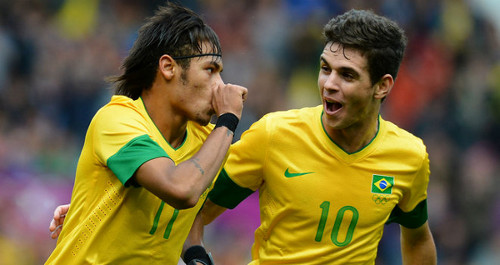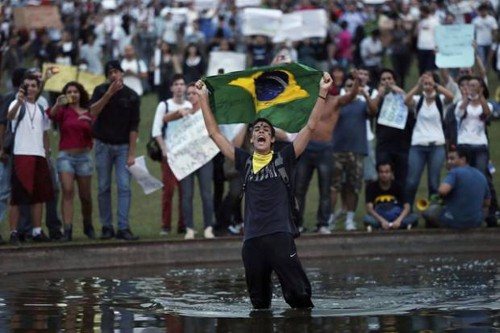Most Brazilians feel that the biggest football festival in the world, along with the foundation of their country, is being stolen from them.
By Marina Amaral and Natalia Viana
On Wednesday, days after massive protests took over the streets, officials in 14 cities in Brazil—including the capitals Sao Paulo, Rio de Janeiro, Porto Alegre, Belo Horizonte and Recife—announced they were reducing public transport fares. It was a historic popular win over the unilateral way transportation, and urban policies in general, are decided in Brazil.
The protesters, however, have announced they will not stop, and further marches are scheduled for the coming days. “We want to discuss the transportation policy,” said a member of the “Free Pass” movement in a press conference.
In many cities, the protests are increasingly directed against the World Cup. In Belo Horizonte and Fortaleza, hundreds of policemen armed with “non-lethal” devices (made by the same Brazilian manufacturer, Condor, that supplies the Turkish police) fired rubber bullets and tear gas bombs as protesters tried to get inside FIFA’s established “exclusion zones” around stadiums that are hosting the Confederations’ Cup. The police admitted that they opened fire only to protect FIFA’s strict rules about circulation in these areas.

Like the urban crisis that presses on in every major city in Brazil, this is a discontent that will not go away easily. Indeed, the skyrocketing investments in the World Cup—to be hosted by twelve Brazilian cities—are only making the poor quality of public services more visible, and a greater source of outrage.
In many ways, the protests prove that FIFA secretary general Jerome Valcke spoke the truth in a press conference in April. “Less democracy is sometimes better for organizing a World Cup,” he said. He also said he expected fewer problems in Russia in 2018 with President Vladimir Putin.
“Dilma, please call me ‘World Cup’ and invest in me. Signed, Education” said a poster in a protest.
The Brazilian government has already spent $13.7 billion on the World Cup, and the overall investment is set to be over $ 16.5 billion, only a little less than the annual national budget for education ($19 billion). Such investments hugely benefit construction companies that are main financers of political campaigns. Some stadiums are even being built in cities like Manaus and Cuiabá that lack a thriving football culture—and therefore are set to become useless “white elephants”.

The projects that are centered around urban mobility, which account for $6 billion, focus on widening roads and building viaducts, following a car-driven logic. They are centered around routes to and from airports to hotels and to stadia, which are not a priority in terms of solving the current mobility crisis. One example is Itaquera, an area in eastern Sao Paulo where much-needed infrastructure works demanded by the local communities have been suspended, while huge investments have been made to improve the access to the opening stadium of the 2014 World Cup.
Social movements claim that 170,000 people are threatened of or have already been removed from their homes, mainly in impoverished communities, or favelas. The residents who can prove ownership of the land (who are not numerous) end up receiving compensation ranging from $1,500 to $5000 or a monthly stipend worth less than $300.
The evictions are often violent, and the whole process lacks transparency and consultation with the local communities. In Morro da Providência, a centenary slum in Rio de Janeiro, people found out that they were to be evicted when their houses were marked overnight with paint, without any previous negotiation. In all cases, the favelas are well located, in places where the land value skyrocketed because of the World Cup, and therefore prone to estate speculation. Besides their homes, the inhabitants lose their communities—in some cases, they had lived there for decades. Mostly they are sent to housing projects far away from—over ten kilometers—and end up in areas with little or no infrastructure.

(Courtesy globeandmail)
Brazil’s cultural heritage has also been threatened. Representatives of indigenous tribes who used to live in the Indigenous Museum around the stadium of Maracanã were expelled. The stadium itself lost most of its characteristics in a renovation that cost over half-a-billion dollars, and included the destruction of public sports venues such as the gymnasium Celio de Barros in order to make room for parking lots.
Since the Brazilian government signed a contract with FIFA in 2007, laws have been speedily approved to guarantee FIFA’s interests under the General Legislation of the World Cup. These exceptional laws allow states and municipalities to incur higher debts for the World Cup than under regular Brazilian laws. The same laws allow a speedier process of environmental licensing and dispense with public bidding in some cases.
For instance, FIFA established a two-kilometer “exclusion zone” around the stadiums. Within these limits, FIFA controls the circulation of people, and forbids the sale of products not allowed by the organization (in the entire country, no store, bar or shop is allowed to use an image of the World Cup mascot unless it was sold by FIFA, or else they can be sued).

(Courtesy Daily Telegrah.co.uk)
According to the NGO Streetnet, during the 2010 World Cup in South Africa 100,000 street vendors lost their income during the games. In Brazil, popular committees have protested the prohibition on the sale of traditional foods, like Savador’s Afro-Brazilian deep fried acarajés. Within the stadia, security is provided by private contractors that are paid for by the Brazilian government but chosen by FIFA.
Exceptional legislation also includes a draft law that established the crime of “terrorism” for the first time since the 1988 constitution, which marked the end of military abuses in the name of eradicating “terrorism” under a dictatorship. The draft law, still to be voted on, establishes tough penalties for those who “promote generalized panic”. For social movements, the vague phrasing is a serious concern because it would allow for the criminalization of democratic protests such as the ones happening now. (On June 19, the Brazilian intelligence services established an online monitoring group to track profiles of protesters on Facebook, Facebook, Twitter, Instagram and WhatsApp, according to the newspaper Estado de São Paulo).
The overall budget for security in the World Cup is about $900 million. Expenses include a $30 million contract with Condor, which has not only supplied arms such as tear gas bombs, pepper spray and rubber bullets to the Turkish police but to the United Arab Emirates and Bahrain. The contract included the delivery of 2,000 short-distance kits and 500 long-distance kits with such arms—the ones currently being heavily used against protesters in all six cities hosting the Confederations Cup—as well as 1,800 taser pistols and 8,300 light and sound grenades.
Editor’s Note: Please read the conclusion of why Brazilians are protesting the World Cup by clicking here
The Nation is a New York-based international magazine.
 Wired868 Wired868 for smart sport news and opinion
Wired868 Wired868 for smart sport news and opinion







VIVA BRAZIL!!!!!!!!!!!!!!!!!!!!!!!!!!!!!!!!!!!!!!!!!!!!!!!!!!!!!!!!!!!!!!!!!!!!!!!!!!!! FIGHT FOR RIGHT!!!!!!!!!!!!!!!!
May God bless these protestors to keep up the fight against the corrupt!! While I denounce violence sometimes change can only come through radical means.People, especially in my beloved country Trinidad and Tobago, need to understand how corruption in high office can affect progression of a nation. I pray for the day when Trinidad and Tobago can truly realise its full potential.This day can ONLY come when the two main races in this country start pulling in the same direction for the common good of our nation and we totally eradicate this “me first mentality.” Politicians have conveniently separated this country racially for years and this current administration is no different. We as part of the citizenry need to understand that we are the ones who have the power, and start demanding better from our high office holders without the psychological pressures of feeling a sense of betrayal because of race and then failing to speak out because of such. It should be,put simply,about wrong or right..good or bad.. and is this going to help the nation move forward or not? If the answer is not it should be denounced strongly if yes,full speed ahead.May God bless our country and help us to realise our full potential.